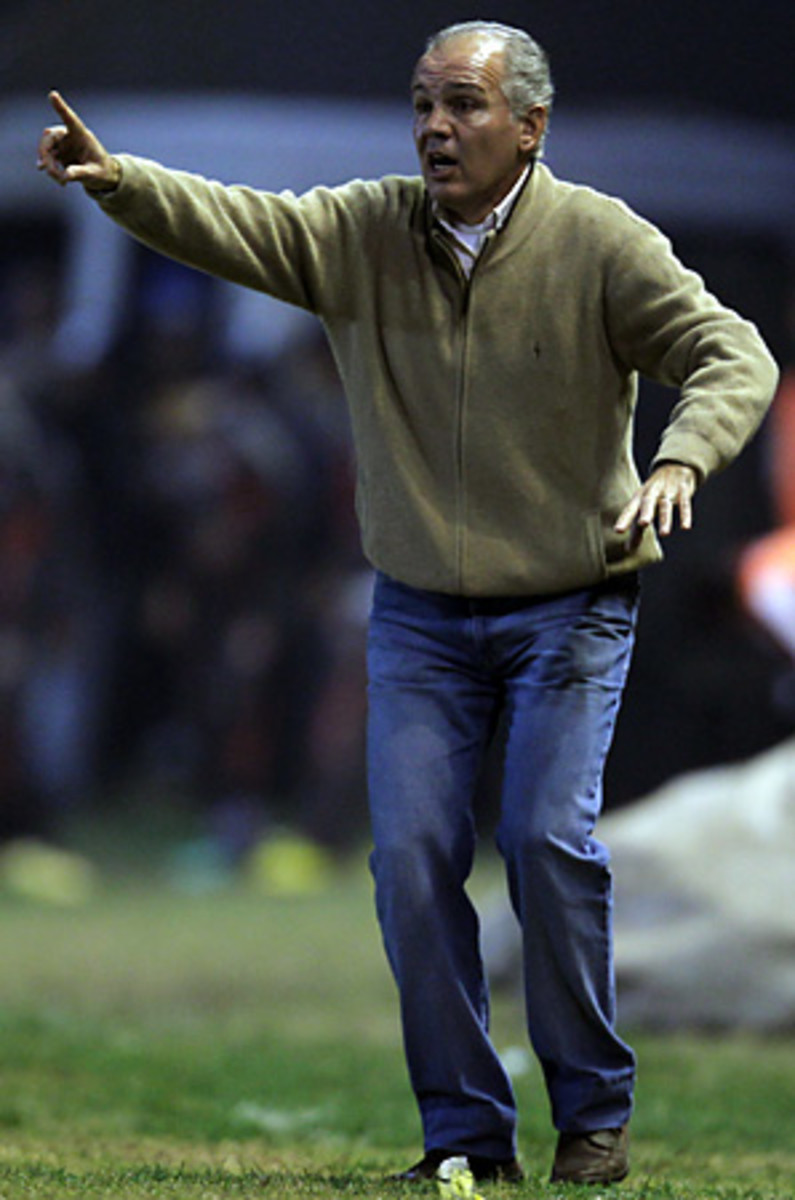Sabella tries to steady Argentina
Sabella is very unlike the boisterous Alfio Basile, the larger-than-life Diego Maradona, or the privately ambitious Sergio Batista -- all three of them appointed in rapid succession to fill the organizational void left after Jose Pekerman's departure in 2006. After a generation of serious, solid, work from the youth divisions up, Pekerman resigned the very night his squad got knocked out of the World Cup in Germany. Since that moment, Argentina's favorite game has been in turmoil. Failing both to win anything significant, or to find a system which allows star Lionel Messi to shine to his full Barcelona potential, each man has left the job with a sense of disappointed expectations.
Will Sabella succeed? Many have their doubts. The appointment has come somewhat in haste. A more popular choice would have been Carlos Bianchi -- the club supremo who has been the people's choice, according to polls, for over a decade. But Bianchi's personal gripe with AFA president Julio Grondona has prevented his nomination. Argentina has fixtures on the calendar, and the regional qualifiers for the 2014 World Cup are just around the corner. Already one friendly (against Romania) has been canceled, so the urgency of finding someone for the job was real. Many feel Sabella is a political choice. Others express concern that he lacks experience.
Sabella is less of an outsider than might appear on paper. He has little experience as sole manager, but ample as assistant to Daniel Passarella, a top dog in the nation's establishment if ever there was one. He's also used to making the most of opportunities which come through trailing the heels of Argentina's more exuberant stars.
He was also a delightful player, an emblematic No. 10 of delicate passes, gentle touches, and intelligent reading of the game and the pitch. He played for River Plate, at the time one of the most important clubs in the land, but his career was just as informed by the fact that he happened to share the team-sheet with a legend: Captain Beto, or Norberto Alonso. Sabella, often relegated to the bench, spent most of the 70s patiently waiting for his chances.
In 1978 he again benefitted from existing in the shadows of major stars. Sheffield United, the English club, had tried to buy a young Diego Maradona, but their offer was rejected. As luck would have it, Sabella was purchased instead. He played in England until the early 80s, joining Leeds after Sheffield went down. Author Neil Clack best summed up Sabella's legacy: "When I was a kid, curly-haired Alex Sabella of Leeds Utd was always a rare soccer star sticker -- I needed him for the set of Leeds and did a playground swap involving 3 other stickers and my tuck shop money."
Remembered as a rare swappie if at all, Sabella nonetheless always played to remain in the game. Seeking the best spaces and chances to hit his target he refused to join Sunderland because they were not in the first division, and finally got to join Estudiantes de La Plata back in Argentina, where Carlos Bilardo was hoping to reignite the flame of success enjoyed by the small club in the late 60s and early 70s.
The role of sidekick accompanied Sabella into management. As second in command to Daniel Passarella he experienced Argentina's international squad from 1994 to 1998. The pair took on Uruguay briefly in 2000/2001, but worked mostly at club level with Parma in Italy, Monterrey in Mexico, Corinthians in Brazil and more notably River Plate in Argentina where they excelled.
It wasn't until 2009 that Sabella took the leap into solo management. He returned to Estudiantes just as the club was becoming the success story of Argentina. Without a doubt, the achievements there lie at the heart of his appointment to the major squad now.
But his challenges at the helm of Argentina will be very different from the Estudiantes setup. For starters, it is widely assumed that Estudiantes rebirth was inspired by the unswerving leadership of Juan Sebastian Veron, a player massively involved in the running of his club. With Sabella, Estudiantes achieved the historic reclaiming of the Libertadores Cup in 2009 (for the first time in 39 years) and won the Apertura tournament in 2010.
But Sabella stepped into a scenario that was pretty much constructed already. As Veron put it at the time of their Libertadores success: "We've had amazing players here at Estudiantes over the past few seasons. Once you have good players, you need a dose of good luck and the rest is just about getting the concept into everyone's head that a good squad can achieve anything."
That could well be the mantra for the much needed national rescue: Argentina has the talent in the players, no doubt about that. It seems the alchemy is somehow missing. Veron pinned down Sabella's contribution at the time for Estudiantes thus: "I think Alejandro has given us back some of that sense of sacrifice we needed as a team, as a group. When a new manager arrives the expectations grow, and in this case an important mood was developed, a sense of sacrifice."
It's very possible Argentina's national game needs a true revolution in its foundations rather than a simple shuffle in middle management. But for now Sabella might just be able to perform that containing role with an absence of controversy and conflict, and instill a work ethic among the supra-talented muscle. For now, that will have to do.





